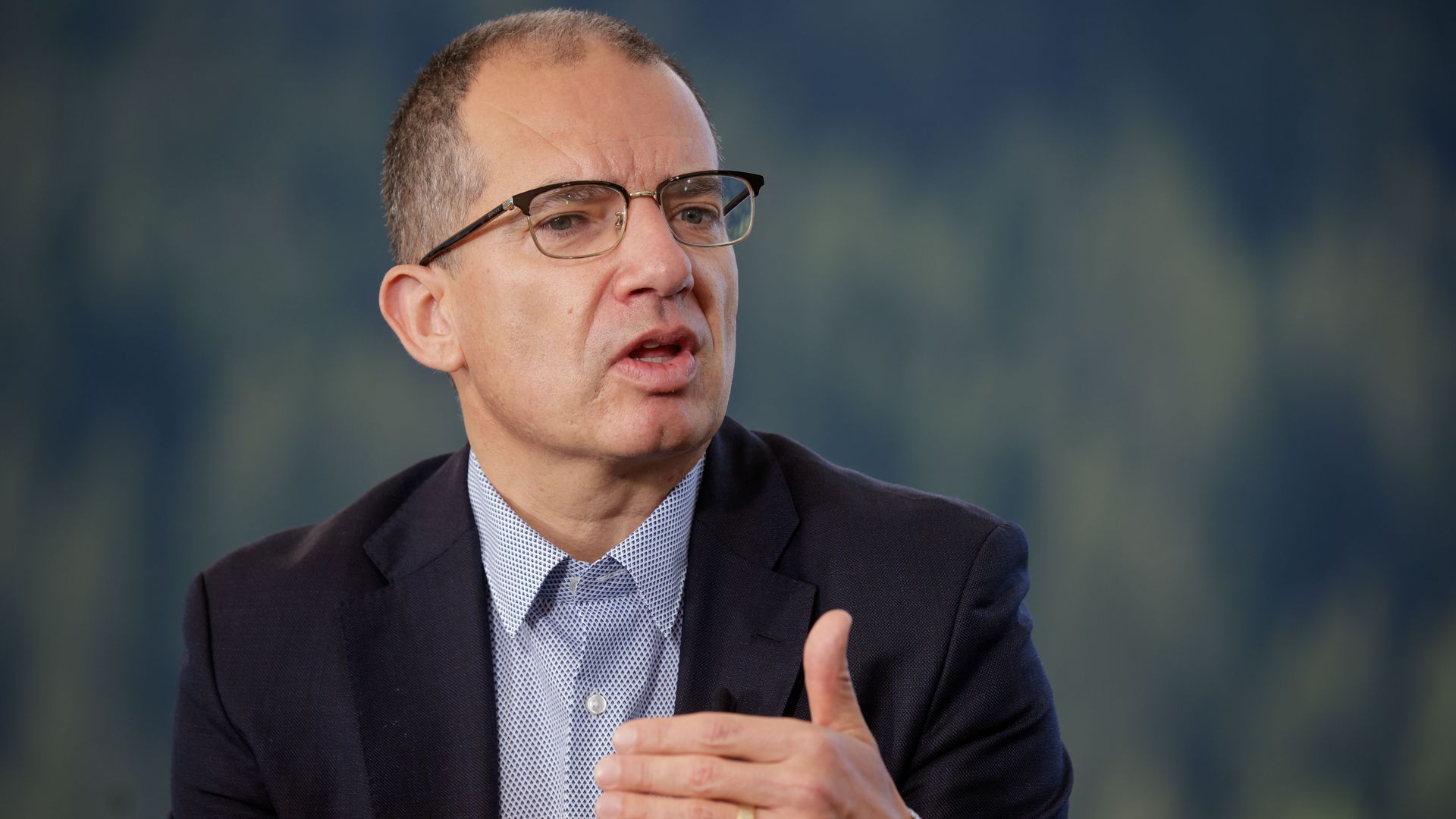| |
| |
| |
| Presented By Better Medicare Alliance |
| |
| Axios Vitals |
| By Tina Reed · Feb 16, 2023 |
| Good morning, Vitals readers. Today's newsletter is 974 words or a 3½-minute read. |
| |
| |
| 1 big thing: Health industry could be playing defense on Medicare |
 |
|
| Illustration: Aïda Amer/Axios |
| |
| After years of trying to squash the expansion of government-funded health care and preserve business from private payers, the health care industry is suddenly facing new threats to the revenue it receives from Medicare, Axios' Caitlin Owens writes. Why it matters: Behind all of the political posturing around sustaining the program is a cold, hard fact — the program's trust fund is expected to go bankrupt as soon as 2028. - To prevent that from happening, lawmakers have three options: raise taxes, cut benefits, or cut payments to the health care industry.
State of play: House Republicans' statements on Medicare have been carefully worded, and notably don't say that the program shouldn't be touched. - After warning that Medicare is "on the pathway to insolvency," House Energy and Commerce Committee Chair Cathy McMorris Rodgers said in a statement last week that "Republicans stand ready to strengthen and preserve these programs, without cutting benefits to seniors."
Driving the news: Amid all of the debt ceiling and spending drama, the Biden administration has proposed two Medicare Advantage payment rules that threaten insurers' profits. - The first claws back billions of dollars in overpayments made to insurers for administering private Medicare plans over the last few years. The second, which was proposed earlier this month and has not been finalized, would decrease payments to Medicare Advantage plans by more than 2% next year, insurers say.
- The payment update could translate into a $540 decrease in benefits per member per year, according to an Avalere analysis funded by the Better Medicare Alliance and released yesterday.
What they're saying: Some Republicans are leaning into the opportunity to accuse Biden of hypocrisy. - But decreasing federal payments to Medicare Advantage plans ranks as one of the most effective ways to cut program spending.
The intrigue: The Medicare solvency discussion is particularly tricky for providers, who absent further action would see drastic payment cuts if the trust fund runs out. Read the rest. |
    |
| |
| |
| 2. Sanders to grill Moderna CEO on vaccine price |
 |
|
| Stéphane Bancel. Photo: Jason Alden/Bloomberg via Getty Images |
| |
| Sen. Bernie Sanders is striking his first blow on vaccine prices as chair of the Senate health committee, Axios' Peter Sullivan writes. Driving the news: Sanders on Wednesday announced he called Moderna CEO Stéphane Bancel to testify in front of the panel next month, setting up a showdown where Sanders can press Moderna over its possible price hikes for its COVID-19 vaccine. Between the lines: Sanders (I-Vt.) has assailed the company for reportedly planning to charge $110 to $130 per dose after it received government backing to develop the vaccine. - The title of the March 22 hearing is "Taxpayers Paid Billions For It: So Why Would Moderna Consider Quadrupling the Price of the COVID Vaccine?"
The backstory: Bancel told the Wall Street Journal last month the company was considering raising the price of the vaccine when government purchases end this year. A version of this story was published first on Axios Pro. Get news like this by subscribing. Use code POLICY100 which gives you $100 off. |
    |
| |
| |
| 3. FDA panel: Narcan spray should be OTC |
 |
|
| Illustration: Gabriella Turrisi/Axios |
| |
| FDA advisers on Wednesday unanimously endorsed making a nasal spray antidote for opioid overdoses available for over-the-counter use, setting up an agency decision on whether to make it available for national distribution, Axios' Sabrina Moreno writes. Why it matters: This is the closest any opioid reversal drug in the U.S. has gotten to not requiring a provider's signoff, which public health experts and advocates have said will be critical in ending the overdose crisis that has killed more than 100,000 Americans in the past year. Catch up quick: The FDA fast-tracked the application for a nonprescription version of Emergent BioSolutions' Narcan in December after pushing drugmakers to submit applications for one last fall. - The cost of the drug hasn't been publicly disclosed, but Emergent BioSolutions plans to "maintain affordability," said company spokesperson Matt Hartwig.
- Yes, but: Some outside estimates range from $32 to $176 — a price tag that could prohibit those most in-need from obtaining it.
|
    |
| |
| |
| A message from Better Medicare Alliance |
| Proposed Medicare Advantage cuts would hurt 30 million seniors |
| |
 |
| |
| 30 million seniors rely on Medicare Advantage for high-quality care at a lower cost. Now, the administration is proposing deep cuts, meaning higher premiums and fewer benefits. With inflation so high, seniors can't afford higher health care costs. Protect 30 million seniors and stop the cuts. |
| |
| |
| 4. Insurers balk at proposed MA marketing rules |
 |
|
| Illustration: Aïda Amer/Axios |
| |
| Medicare Advantage and Medicare drug plans told the Centers for Medicaid and Medicare Services that too much regulation at once could drive up costs and result in increased premiums or fewer benefits, Axios' Arielle Dreher and Maya Goldman write. Driving the news: Public comment closed this week on a proposal to crack down on Medicare Advantage marketing practices, impose other standards on Medicare drug plans and create requirements to increase access to behavioral health and culturally competent care. Why it matters: Complaints about aggressive sales tactics and other issues connected with private Medicare plans have the attention of Congress and CMS' proposal seeks to rein that in. But insurers still have a powerful voice. Zoom in: The trade group AHIP said it backed policies CMS proposed to reduce beneficiary confusion. But some proposals "could unduly inconvenience seniors and people with disabilities," the trade group wrote in a comment letter. |
    |
| |
| |
| 5. Docs allege safety concerns at HCA hospital |
| Corporate cost-cutting has led to unsanitary conditions, poor ICU patient monitoring and an uptick in errors at a 290-bed HCA Healthcare hospital on the Gulf Coast of Florida, according to an NBC News report. Why it matters: HCA is among the largest publicly-traded health systems in the U.S., posting $5.6 billion in profits in 2022, and accounting for 182 hospitals and 125 surgery centers across the U.S. and in the U.K. Driving the news: Four doctors who spoke with NBC allege quality began declining amid cost-cutting at the hospital in 2021, such as swapping its anesthesiologist staff for contract workers. - They also provided recent photos from the facility showing "ceiling leaks in a recovery room, oxygen equipment held together with tape, bloody and backed-up sinks, wires dangling from a hole in the wall and cockroaches in the operating room," per NBC.
The other side: "We take quality issues very seriously, no matter who raises them. We rely on feedback from our physicians, and when issues are validated we take necessary action," an HCA spokeswoman told Axios in an emailed statement. |
    |
| |
| |
| A message from Better Medicare Alliance |
| Why the proposed cuts to Medicare Advantage will hurt seniors |
| |
 |
| |
| The proposed cuts to Medicare Advantage are unprecedented and will drive up premiums and cut benefits for seniors at a time of high inflation. Now isn't the time for cuts. The administration must protect the stability of this vital program, which 30 million seniors rely on every day. See why. |
| |
| Have a news tip? Just reply to this email. Did someone forward this email? Subscribe here. Thanks for reading, and thanks to senior editor Adriel Bettelheim and senior copy editor Bryan McBournie for the edits. |
 | | Your personal policy analyst is here. | | |








No comments:
Post a Comment